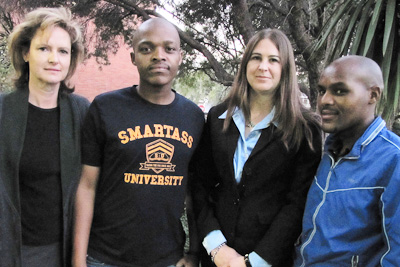Latest News Archive
Please select Category, Year, and then Month to display items
12 October 2020
|
Story Dr Cindé Greyling
|
Photo Supplied
 Exercise and nutrition can work wonders for your mental health – you don’t even have to ‘feel like’ or ‘enjoy’ moving around and eating well for it to work – it does its thing anyway.
Exercise and nutrition can work wonders for your mental health – you don’t even have to ‘feel like’ or ‘enjoy’ moving around and eating well for it to work – it does its thing anyway.
Nowadays, people talk about mental health like it is the common cold – which is good! But do you know what it really means? Being mentally healthy does not only refer to the absence of a mental illness but includes your emotional and social well-being. One would almost want to add physical well-being too, since a healthy body does indeed support a healthy mind. However, since so many people consider themselves ‘mental health experts’, some myths have been sold as truths.
Myth #1 – You are doomed.
Nope. Never. You are never doomed. There is always help. Mental-health therapies range from self-help, talk therapy, medication, to hospitalisation in some cases. Somewhere on this spectrum of treatments, there will be something that works for you. But you must be willing to get the help and do the work. For starters, exercise and nutrition can work wonders – you do not even have to ‘feel like’ or ‘enjoy’ moving around and eating well for it to work – it does its thing anyway.
Myth #2 – It won’t affect you.
It may. Research suggests that one in five people may suffer from a mental illness at some point in their lives. Being well now does not mean that it will stay that way. Biological and environmental factors both impact your mental health. Hopefully not, but at some point, you may experience an event that affects your mental health.
To remain integrated in a community is always beneficial
for anyone suffering from a mental or physical condition.
Myth #3 – Someone struggling with mental health must be left alone.
Hardly! To remain integrated in a community is always beneficial for anyone suffering from a mental or physical condition. You do not need to fix them, but to remain a friend. Continue to invite them, even if they decline. Do not judge, and do not try to understand. Just stay around.
Go and be kind to yourself, and to those around you.
UFS students listen to world expert in environmental law
2010-08-05
 |
Dr Ilze Keevy, Kabelo Khara, LL.B. final-year student in Environmental Law, Adv. Antoinette Ferreira, and Luthando Tshangana, also an LL.B. final-year student in Environmental Law.
Photo: Leonie Bolleurs |
In one of her classes, Dr Ilze Keevy, Senior Lecturer in the Department of Constitutional Law and Philosophy of Law at the University of the Free State (UFS), invited Adv. Antoinette Ferreira, a Senior Prosecutor at the Special Prosecution Unit of the Director of Public Prosecution: Free State, this week to present an interesting and topical lecture about Organised Environmental Crime and Biodiversity. The lecture was, amongst others, attended by LL.B., LL.M. and LL.D. students in Environmental Law, as well as master’s students in Environmental Management.
Adv. Ferreira, who is currently working on one of the world’s most important syndicate cases about rhinoceros hunting, dealt with environmental law in her lecture, with the focus on organised crime syndicates. Issues like how syndicates operate, the prosecution of syndicates and all the problems related to the destruction of our South African biodiversity formed part of her lecture. – Leonie Bolleurs